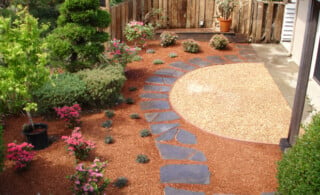
Many homeowners are so focused on keeping their lawn free of insects and other pests that they don’t realize they need to be equally concerned with lawn fungus. Lawn fungus can be absolutely lethal to a lawn in a way few pests are. If you’re unaware of the behavior of fungal spore you may be creating an environment ripe for fungal growth right now. Worse, even conscientious homeowners may still find their lawns under attack despite their best efforts. Especially during periods of unseasonably high rainfall, lawn fungus may rapidly cripple your lawn, cost you a bunch of money in extra lawn service, and leave unseemly patches in your lawn.
Common Types of Lawn Fungus
- Fairy Ring: This lawn fungus tends to leave ring formations of dark green and/or dead grass. In more extreme cases, you may even see patches of brown mushrooms. Fairy ring flourishes especially near dead vegetation such as tree stumps and thatch.
- Rust: Light green to yellow to brown grass is the calling card of rust fungus. Heavy dew and excessively warm, moist weather helps spurn the growth of this fungus.
- Pink Snow Mold: Identified by brown patches and yellow grass showing white or pink fungus spots after heavy rains. Heavy snow covers often associated with hills or banks can often lead to this fungus.
- Slime Mold: White, yellow, or gray slime shows the presence of slime mold that clings to grass and occurs during prolonged wet periods. Slime mold also likes grass that has been left unmowed.
Lawn Fungus Prevention
The best plan for dealing with lawn fungus is to do everything you can to prevent it. By the time you see noticeable signs that lawn fungus has infiltrated your lawn, it will probably be extremely difficult to control. More than half your lawn you may be destroyed seemingly overnight. Few fungal spores have easy fixes, but most instances of lawn fungus can be avoided with a few lawn maintenance tips.
The most common mistake homeowners make is to overwater their lawn. It seems counterintuitive, especially during the hot, summer months, but overwatering your lawn can be more harmful to your lawn that not watering it at all. Just as important as how much you water your lawn is the time of day you do it. Most homeowners water their lawn when they get home from work or later in the evening. This can leave your lawn damp for hours, allowing fungus to get a foothold in your yard. Watering your lawn in the morning will allow the sun to quickly evaporate any excess water. If you don’t have the schedule and/or the discipline to water your lawn in the morning, you should invest in a lawn irrigation system with a timer. These systems are going to be cheaper in the long run than treating your lawn for disease.
Over-fertilizing and over-seeding are also big problems. Between the soft, lush blades created by high nitrogen levels and the thick texture of dense grass blades, fungal spores will find it easy to jump from blade to blade as they are dispersed. At the very least, talk to a lawn care company about using fungicide in accordance with your lawn fertilizer. Keep in mind that no lawn care is perfect, and some preventative measures for lawn fungus may create other problems. Only a comprehensive lawn care program will help keep your lawn free of fungus, insects, weeds, and diseases all at the same time.
Ready to start your lawn fungus?
Find ProsLawn Fungus Control
Different fungal spores may require different treatments. In some cases, you may be able to remedy the problem with simple mowing and raking in conjunction with a specific watering pattern. More likely, you’ll need to treat your lawn a fungicidal treatment. Unfortunately, many kinds of lawn fungus quickly develop a resistance to even the best fungicide. Given the worst-case scenario, you may need to reinstall sod or re-grow a section of your lawn if fungus begins to take over.
 Raising Chickens at Home
Raising Chickens at Home  Spring Garden Flower Tips and Suggestions
Spring Garden Flower Tips and Suggestions  Plan Ahead for a Better Yard
Plan Ahead for a Better Yard  Dry Well Cleaning & Maintenance Tips
Dry Well Cleaning & Maintenance Tips  French Drains
French Drains 

Are You Familiar With This Topic? Share Your Experience.